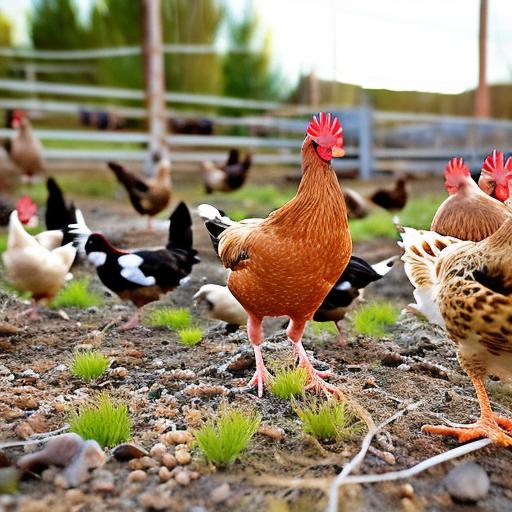Backyard chicken keeping has become increasingly popular in Clark County, Nevada in recent years. Many residents are drawn to the idea of having their own flock of chickens for a variety of reasons. Not only do chickens provide fresh eggs and meat, but they also offer the opportunity for educational experiences and can even serve as natural pest control in the garden. In this article, we will explore the ins and outs of backyard chicken keeping in Clark County, including legal requirements, choosing the right breed, building a chicken coop, feeding and caring for chickens, common challenges, health and safety considerations, and the benefits of keeping chickens.
Key Takeaways
- Keeping chickens in Clark County, Nevada is a popular hobby for many residents.
- Legal requirements include obtaining a permit and following zoning regulations.
- Choosing the right breed is important for egg production and climate adaptation.
- Building a secure and ventilated coop is necessary for the chickens’ safety and comfort.
- Feeding and caring for chickens in the desert climate requires attention to hydration and nutrition.
Legal Requirements
Before embarking on your backyard chicken keeping journey in Clark County, it is important to familiarize yourself with the laws and regulations surrounding this activity. In Clark County, residents are allowed to keep up to six hens on properties that are at least 7,000 square feet in size. Roosters are not permitted due to noise concerns. Additionally, chickens must be kept in a secure enclosure that is at least 10 feet from any neighboring property lines.
To keep chickens legally in Clark County, you will need to obtain a permit. The permitting process involves submitting an application along with a fee. The fee varies depending on the number of chickens you plan to keep. It is important to note that failure to obtain a permit can result in fines or other penalties.
Choosing the Right Breed
When it comes to selecting a breed of chicken for your backyard flock in Clark County, there are several factors to consider. First and foremost, you will want to choose a breed that is well-suited to the desert climate. Some breeds that thrive in hot weather include the Rhode Island Red, Australorp, and Leghorn.
In addition to climate considerations, you may also want to think about other factors such as egg production, temperament, and size. If you are primarily interested in egg production, breeds such as the Plymouth Rock or Sussex may be a good choice. If you have children and are looking for a friendly and docile breed, the Orpington or Silkie may be a better fit. Ultimately, the breed you choose will depend on your specific needs and preferences.
Building a Chicken Coop
Building a chicken coop that meets Clark County regulations is an important step in backyard chicken keeping. The coop should provide adequate space for your chickens to move around comfortably and should also protect them from predators. It is recommended to use sturdy materials such as wood or metal for the construction of the coop.
When designing your chicken coop, it is important to consider factors such as ventilation, lighting, and nesting boxes. Proper ventilation is crucial to prevent the buildup of moisture and ammonia, which can lead to respiratory issues in chickens. Natural lighting is also important for the health and well-being of your flock. Finally, providing nesting boxes will give your hens a safe and comfortable place to lay their eggs.
Feeding and Caring for Chickens
Feeding and caring for chickens in the desert climate of Clark County requires some special considerations. It is important to provide your chickens with a balanced diet that includes a combination of commercial feed, fresh fruits and vegetables, and access to forage. In the hot weather, it is especially important to provide plenty of fresh water to keep your chickens hydrated.
In addition to their diet, there are other aspects of care that are important for keeping chickens healthy and happy. Regularly cleaning the coop and providing fresh bedding will help prevent the buildup of bacteria and parasites. It is also important to monitor your chickens for signs of illness or injury and seek veterinary care if necessary.
Common Challenges

Keeping chickens in Clark County does come with its fair share of challenges. One common challenge is dealing with predators such as coyotes, raccoons, and hawks. It is important to take measures to secure your coop and run to prevent these predators from gaining access to your flock. This may include using hardware cloth instead of chicken wire, installing a secure latch on the coop door, and providing a covered run area.
Extreme temperatures can also pose a challenge for backyard chicken keepers in Clark County. During the hot summer months, it is important to provide shade and plenty of fresh water to prevent heat stress in your chickens. In the winter, you may need to provide additional insulation or heat sources to keep your flock warm.
Health and Safety Considerations
Maintaining proper hygiene and sanitation is crucial for the health and safety of your chickens. Regularly cleaning the coop and removing any waste will help prevent the spread of bacteria and parasites. It is also important to practice good biosecurity measures, such as washing your hands before and after handling chickens, to prevent the spread of diseases.
It is also important to monitor your chickens for signs of illness or injury. Common signs of illness in chickens include lethargy, loss of appetite, changes in behavior, and abnormal droppings. If you notice any of these signs, it is important to seek veterinary care as soon as possible.
Benefits of Keeping Chickens
There are numerous benefits to keeping chickens in Clark County. One of the most obvious benefits is the availability of fresh eggs and meat. Not only are homegrown eggs delicious, but they are also more nutritious than store-bought eggs. Chickens also provide a source of natural fertilizer for your garden, helping to improve soil health and promote plant growth.
In addition to the practical benefits, keeping chickens can also be a fun and educational experience for both children and adults. Children can learn about responsibility, animal care, and where their food comes from through caring for chickens. Chickens can also provide entertainment with their quirky behaviors and personalities.
Getting Started
Before bringing home chickens, there are several steps you should take to ensure a successful experience. First, make sure you have a suitable space for a chicken coop and run. Measure the area to ensure it meets the minimum requirements set by Clark County. Next, research and choose the breed of chickens that best suits your needs and preferences.
Once you have your space and breed selected, it is time to purchase your chickens. There are several options for purchasing chickens in Clark County, including local feed stores, online hatcheries, and local breeders. It is important to choose a reputable source that provides healthy and well-cared-for birds.
Resources and Support
If you are considering backyard chicken keeping in Clark County, there are several resources and support available to help you along the way. Local organizations such as the Southern Nevada Poultry Fanciers Association can provide guidance and support for chicken owners. There are also numerous books and websites dedicated to backyard chicken keeping that can provide valuable information and tips.
Backyard chicken keeping in Clark County, Nevada offers a variety of benefits, from fresh eggs and meat to educational opportunities for children. While there are legal requirements and challenges to consider, with proper planning and care, keeping chickens can be a fun and rewarding hobby. Whether you are interested in providing your family with fresh eggs or simply enjoy the company of these feathered friends, backyard chicken keeping is worth considering in Clark County.
If you’re wondering whether you can keep chickens in Clark County, Nevada, you’ll be glad to know that it is indeed possible. In fact, there are many resources available to help you get started on your backyard chicken-keeping journey. One such resource is an informative article on PoultryWizard.com titled “Producers Pride Sentinel Chicken Coop: A Perfect Solution for Clark County Residents.” This article discusses the benefits of using the Producers Pride Sentinel Chicken Coop specifically designed for urban environments like Clark County. It provides valuable insights into the coop’s features and how it can help you successfully raise chickens in your backyard. For more information, check out the article here.
FAQs
What are the regulations for keeping chickens in Clark County, Nevada?
Clark County allows residents to keep chickens as long as they comply with certain regulations. These regulations include obtaining a permit, keeping the chickens in a secure enclosure, and following guidelines for the number of chickens allowed per property size.
How many chickens can I keep in Clark County?
The number of chickens allowed per property size varies in Clark County. For properties less than 1/2 acre, residents can keep up to six chickens. For properties between 1/2 acre and 1 acre, residents can keep up to 12 chickens. For properties larger than 1 acre, residents can keep up to 24 chickens.
Do I need a permit to keep chickens in Clark County?
Yes, residents in Clark County need to obtain a permit to keep chickens. The permit application requires information about the location and size of the chicken enclosure, as well as the number of chickens being kept.
What are the requirements for the chicken enclosure in Clark County?
The chicken enclosure in Clark County must be secure and provide adequate space for the number of chickens being kept. The enclosure must also be located at least 20 feet from any neighboring residence and 50 feet from any public street.
Are there any restrictions on roosters in Clark County?
Yes, Clark County prohibits residents from keeping roosters unless they obtain a special permit. The permit requires additional requirements, such as soundproofing the chicken enclosure and obtaining written consent from all neighboring residents.
Meet Walter, the feathered-friend fanatic of Florida! Nestled in the sunshine state, Walter struts through life with his feathered companions, clucking his way to happiness. With a coop that’s fancier than a five-star hotel, he’s the Don Juan of the chicken world. When he’s not teaching his hens to do the cha-cha, you’ll find him in a heated debate with his prized rooster, Sir Clucks-a-Lot. Walter’s poultry passion is no yolk; he’s the sunny-side-up guy you never knew you needed in your flock of friends!








Chickens, hens, roosters are not allowed in residential areas of Clark County NV! Please update your info.
It depends on HOA, as the article says you will always need to check with your HOA and follow specific regulations for your property. The government loves to put in convoluted requirements 🙂